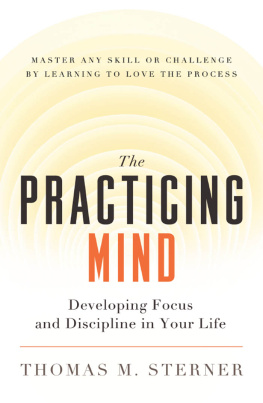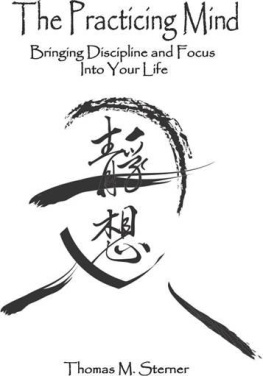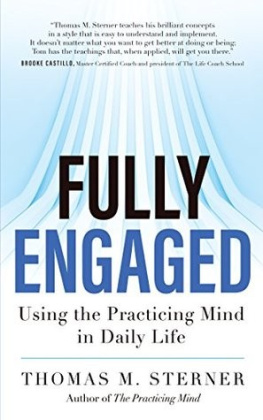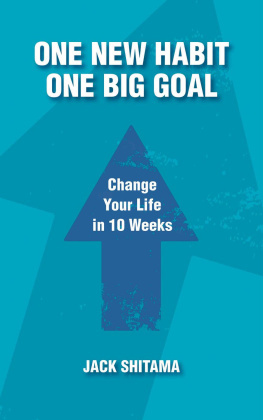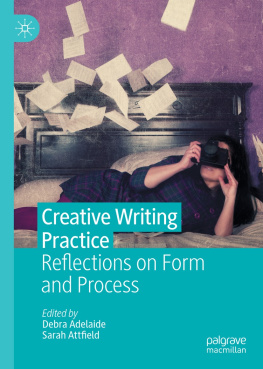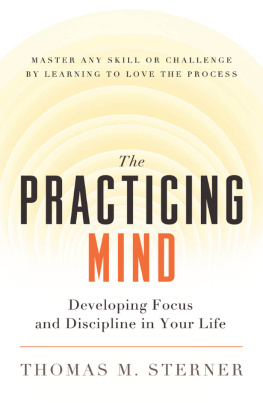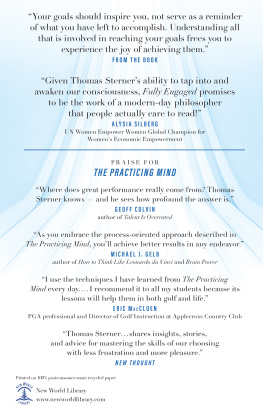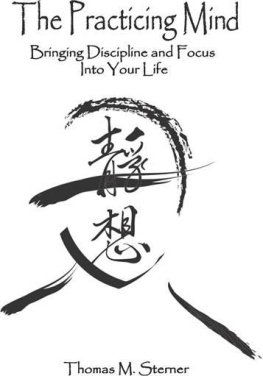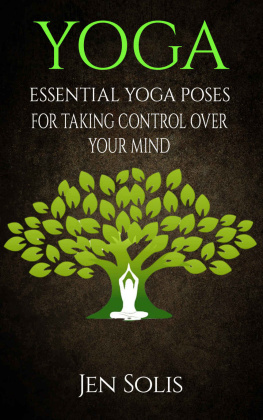More Praise for The Practicing Mind
Thomas Sterners book has provided helpful information in all areas of my life. As a business leader, I became more effective; as a public speaker, more dynamic; as a parent, more attentive; and with my weekend hobbies, I learned to have more fun and increase skills. The Practicing Mind helped me realize that the way to get to an end was just as important as the end, if not more so. Life is a journey and not a destination; thanks to Mr. Sterner, I love the journey.
Ralph Citino, banking professional
The Practicing Mind engagingly transforms difficulty into devotion, offering a practical, easy-to-understand approach that will transform your view of even the most challenging or mundane steps on your journey of life. In clear language and interesting personal anecdotes, Thomas Sterner shows us that by mindfully focusing on the process of pursuing our goals, we can let go of attachments to the outcomes we cannot control. So much suffering in our modern world could be alleviated if everyone absorbed Sterners very wise lessons.
Marney K. Makridakis, author of Creating Time
and founder of Artellaland.com
In The Practicing Mind, Tom Sterner achieves a rare combination: he provides not just a clear set of practical steps for creating focused effort but also a theoretical background that can help us to reframe our expectations and values so that we can keep in perspective the difference between process and product, progress and goals. Highly recommended.
Dr. Scott A. Davison,
professor of philosophy at Morehead State University
and author of On the Intrinsic Value of Everything
Thomas Sterner elucidates a paradox of life: real achievement requires patience and discipline, and in order to develop these qualities one must apply both of them. He then guides us, with many practical examples from his own experience, to resolve this paradox through the application of mindfulness. Sterner shows us how to be present, how to observe without judging, and in the process, we liberate our natural ability to learn. Paradoxically, as you embrace the process-oriented approach described in The Practicing Mind, youll achieve better results in any endeavor.
Michael J. Gelb, author of
How to Think Like Leonardo da Vinci
and Brain Power: Improve Your Mind as You Age
In a society of immediate gratification, Thomas M. Sterners book The Practicing Mind almost parodies itself. Designed to be a primer for slowing down, becoming more aware of the present moment, and increasing self-discipline and focus, Sterners brilliance shines through in the brevity of this complex books pages.... [T]his tiny but intense book delivers enough information to contemplate and apply for a lifetime.
Roundtable Reviews
Developing Focus and Discipline in Your Life
THOMAS M. STERNER


Copyright 2005, 2012 by Thomas M. Sterner
All rights reserved. This book may not be reproduced in whole or in part, stored in a retrieval system, or transmitted in any form or by any means electronic, mechanical, or other without written permission from the publisher, except by a reviewer, who may quote brief passages in a review.
Originally published by Mountain Sage Publishing in 2005
Text design by Tona Pearce Myers
Library of Congress Cataloging-in-Publication Data
Sterner, Thomas M., date.
The practicing mind : developing focus and discipline in your life : master any skill or challenge by learning to love the process / Thomas M. Sterner. 1st ed.
p. cm.
Includes index.
ISBN 978-1-60868-090-0 (pbk. : alk. paper)
1. Mind and body. 2. Persistence. 3. Self-control. I. Title.
BF151.S74 2012
153.1'534dc23 2011050865
First New World Library edition, April 2012
ISBN 978-1-60868-090-0
Printed in Canada on 100% postconsumer-waste recycled paper

| New World Library is proud to be a Gold Certified Environmentally Responsible Publisher. Publisher certification awarded by Green Press Initiative. www.greenpressinitiative.org |
10 9 8 7 6 5 4 3 2 1
This book is dedicated
to the gentle spirit of my mother,
Margaret Sterner.
You taught so many, so much,
with so few words.

I would like to thank the people who made this book possible.
To my wife, Jamie, and my two daughters, Margie and Melissa, I say thank you for believing in me and being patient with the long process of getting here.
To my father, I must say thank you for a lifetime of support and friendship beyond any words.
Finally, to my close friend and editor (perhaps an unusual combination) Lin Bloom McDowell, thank you for helping me to say what I needed and wanted to say. Editors are the invisible heroes who make creating a book possible.
R eal peace and contentment in our lives come from realizing that life is a process to engage in, a journey down a path that we can choose to experience as magical.
The Practicing Mind is about remembering what you already know at some level and bringing that memory into the present, where it will both serve to place you on that path and empower you to partake in the journey. This book will reintroduce you to a process you followed to acquire a skill before you knew what process meant, and it will remind you that life itself is nothing more than one long practice session, an endless effort to refine the motions, both physical and mental, that compose our days.
We all understand that activities such as learning to play a musical instrument and developing a fundamentally sound golf swing are skills and as such require practice. But in fact, life is a journey that requires and even forces us either consciously or unconsciously to master one skill after another. We easily forget that when our lives here began, learning to walk and to articulate our thoughts and feelings started from a place of no skill. Driven by both desire and necessity, we mastered these skills one step at a time, one sound at a time, and, perhaps most important, without a sense of struggle. Just as with such endeavors as music or golf, we acquired these skills by the process we call practice: the repetition of an activity with the purposeful awareness and intention of accomplishing an intended goal.
In our overpaced and overstressed world today, we use the word skill to define a personal asset; for example, we might say, That is not part of my skill set. At the same time, our recognition of the value of possessing many diverse skills is expanding. Ironically, though, we miss the point that the ability to develop any skill as swiftly as possible, with the least amount of effort, and even to experience inner peace and joy in the process, is in fact a skill itself, and one that requires constant practice to become an effortless part of who we are.

